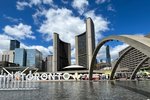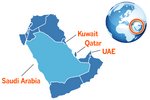My Experience as an EMS Supervisor in Jeddah
By: Charles Andrew Hoar
 In September 2009, two of our recruiters, Donna Radey and Cindy Piccolo visited the King Faisal Specialist Hospital - Jeddah (KFSH-J) and spoke with Charles Andrew Hoar, EMS Supervisor, who agreed to answer questions about his department. To start, please tell us a little bit about yourself.My name Is Charles Andrew Hoar, and I come from New Brunswick, Canada. I was a firefighter for five years, and I've been a Paramedic going on 15 years. I moved to Saudi Arabia in October of 2004 and have lived in Jeddah ever since. The transition to Jeddah was much easier then I anticipated, and to this day have had very little difficulty here. The staff are very supportive and go out of their way to make you as comfortable as possible. The most important factor in reducing culture shock and uneasiness, when you come not just to this country, but to any new area of the world, is to understand that you are not at home. You need to be open-minded and try to not necessarily accept what you experience, but to understand it and learn from it. After five years I have learned so much and experienced things I could never have dreamed possible. Tell us about Ambulance Services at the KFSH-J.At present time (January 2010) we have four ambulances, five drivers, five Paramedics, and five EMTs. Our drivers are from Saudi Arabia, Yemen, and Sudan; our Paramedics are from Canada, the United States, Finland, and Saudi Arabia; and our EMTs are from the Philippines and the United States. Our Emergency is quite busy, has 23 beds, and the medics and nursing staff work closely together. The triaging expertise of the Paramedics is used quite often in the triage area and we take a strong role in code and trauma situations. Who is served by Ambulance Services at the KFSH-J?Our practice basically involves responding to hospital staff emergencies at hospital housing, VIP emergencies and escorts, discharges and intra-facility transfers, and receiving or delivering medevac ICU patients What would be an average day on the job for a Paramedic or EMT?Our call volume is very unpredictable — anywhere from one to nine calls daily — and we are getting busier. How is your work different from what it would be in Canada or the USA?Well, in some ways it's a bit easier. We don't respond to emergencies in the city, except in the case of specific patients and hospital staff. The service does not see as much trauma as in North America, but its not unheard of. The VIP patients make the job interesting, and they represent something that would not be common in Canada or the United States. It's something unique to experience. How will the expansion of the KFSH-J affect your department?Our service will need to grow significantly in vehicles, equipment, and staff. The ambulance service will be much busier and, for me, it will be a great challenge to run this facility's ambulance service. It's an exciting time to be a part of this service. What do you enjoy about 1) working in Jeddah and 2) working at the KFSH-J?Jeddah has so much to offer, it's overwhelming. First, the scuba diving is like nowhere else. I have gone diving in many countries, but the Red Sea is absolutely the best I've ever seen, and there is always someone to go with. We have all sorts of trips available, from beach diving to boat day trips, and even three-day trips on a yacht out in the middle of the sea! The night life is always hopping — not like it would be in North America, but we have great restaurants and coffee shops, and the hospital housing is five minutes from the sea, where you can sit with your friends and enjoy your evening listening to the waves. Working here has been one experience after another, but the one thing this hospital has excelled at is improving my career. The work experiences and support for training are abundant. Since I have been promoted to Supervisor of the ambulance service, I am constantly learning and taking on new tasks and responsibilities that help me grow as a person and as a medic. What have been the challenges you have faced 1) by working in Saudi Arabia and 2) in this job in particular?The biggest adjustment has been just getting use to the way things work and the different obstacles that we have here that you would not see in other countries. Working anywhere will present different obstacles; it's just a matter of how you face and eliminate them. In Jeddah, of course, there are some cultural adaptations needed and remembering what is allowed and what is not. Traffic is a unique experience here as well, but manageable. As for the hospital, the biggest challenge has been understanding the process of communication between departments and the amount of time it may take to achieve some goals. In the end, we all learn from any of the experiences we see here in Jeddah. What advice would you give to a paramedic or EMT considering applying for a position at the KFSH-J?If you are up for adventure, want a good salary, enjoy traveling, and want new experiences, this is the place to be. Traveling is very cheap and easy from this location, and you have close to two months vacation a year! The work is not difficult, the crew is like family, and the support from the rest of the hospital is great. If you're tired of snow, and love the beach, this is the place for you! What do you do in your spare time in Jeddah?Scuba diving is at the top of my list, while BBQing, meeting friends, sitting on the beach, fine dining, and hanging out with friends are what I do on a weekly basis. Most Popular |
Related |
Copyright (C) 2025 Helen Ziegler and Associates. All rights reserved.







